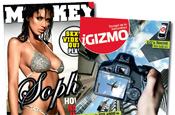
Dennis Publishing's planned launch of its third digital magazine, or e-zine, a motoring title, has been welcomed by digital publishing evangelists. Yet other observers are questioning whether such ventures will win over advertisers and publishers in the long run.
Dennis already publishes two e-zines, well-established digital lads' mag Monkey and gadget offering iGizmo, which launched in March and, like Monkey, is delivered free of charge to readers' inboxes.
Monkey, which was billed as a genuine innovation when it launched in November 2006, is due to hit profit by the end of the year, according to Dennis.
Its first ABCe figure, released in January 2007, stood at more than 200,000, and currently totals 270,000-plus - more than twice Dennis' launch target. The title has subsequently branched out across other platforms, including mobile.
Perhaps buoyed by the performance of Monkey, a raft of similar e-zine launches have followed. Speech radio station TalkSport is set to launch an e-zine, while digital publisher Made up Media has struck a deal to publish a title for ITV, around its forthcoming show Football Legends.
Winning advertisers
While some may question the extent of reader engagement with e-zines - most are delivered during the working week to recipients' e-mail addresses - digital publishers say that their circulation is rigorously audited and provides sufficient details of visits. Most importantly, they are starting to win over sceptical press buyers.
Yet e-zines, which are web-only titles and not merely online versions of existing printed publications, have been snubbed by some major magazine publishers such as Condé Nast.
Critics argue that the e-zines' financial model is unproven, with some publishers preferring instead to focus their digital efforts around establishing online versions of existing print titles.
Dominic Duffy, co-founder of Ceros, which publishes digital editions of magazines for clients including IPC and the BBC, says: "In some cases, it is quite a challenge to change publishers' minds, as they are inherently linked to print and some see these launches as a threat to traditional printed products."
The National Magazine Company was another publisher that has dabbled in e-zines when last year it launched Jellyfish, a digital magazine aimed at teenage girls.
Jellyfish readers were asked to sign up to a weekly e-mail that would send them to a site hosting the latest issue, where they could watch embedded video and editorial content.
The title, however, closed down after less than six months, although the company claimed it had been merely a test exercise and not a fully fledged launch.
Critics, however, say that Jellyfish failed because spam filters hindered its distribution.
Despite the patchy record of the sector, e-zines offer a relatively cheap launch platform for publishers who have been wary of major print launches in recent times.
E-zines provide advertisers with new formats to engage consumers and offer publishers a new means of luring reader eyeballs.
The key to a successful e-zine, according to Iestyn George, founding director of Made Up Media, is to make use of a range of communication tools and not to simply replicate magazine content.
He says: "The [e-zine] format doesn't lend itself to long features. But you have to use communication across a range of platforms, such as audio and animation, and use little editorial nuggets. You have to create a product that is easy to flick through."
Better reception
Richard Downey, publishing director at Monkey, says that, despite initial scepticism, advertisers have now become more accepting of the e-zine model, and points to brands such as Foster's and McDonald's that have created tailored ads for Monkey.
Downey says: "One of the big things for us was getting our first ABCe." This has helped to lure advertisers in.
Downey adds that one reason publishers have shied away from launching e-zines is because they don't have sufficient database capacity - specifically enough quality e-mail addresses for potential readers - to launch such ventures.
From an advertiser point of view, e-zines make up a small part of media buyers' schedules, but some believe this could change as radio and TV players such as TalkSport and ITV become more involved in the sector.
Paul Thomas, head of press at MindShare, says e-zines are a lot cheaper to produce and lend themselves to further brand extensions. "Digital magazines are interesting as far as new technology is concerned," he said. "But it has yet to be cracked."
PUBLISHERS' E-ZINES
- Dennis Publishing launched lads' e-zine Monkey in 2006 and followed up with gadget title iGizmo this year. It is considering launching a motoring e-zine.
- Whisper Magazine (whispermag. co.uk) launched last week by two ex-Dennis staffers, it is the first e-zine aimed at women, billed as an antidote to dry and conservative women's mags.
- Start-up digital sports publisher Made Up Media publishes free football e-zine, Catflap, golfing title In Golf We Trust, and rugby union publication Scrum of the Earth. It has recently picked up the contract to publish a title around upcoming ITV4 show, Football Legends.
- Speech radio station TalkSport will launch TalkSport Magazine in the summer, delivered to subscribers' inboxes once a week.
- NatMags launched Jellyfish on a trial basis in March 2007, originally aiming it at teenage girls, but it was closed last August

